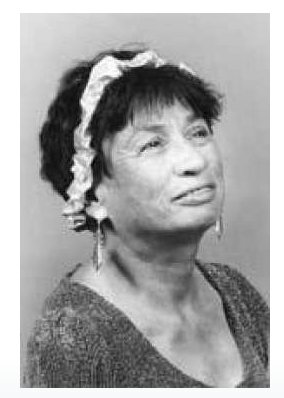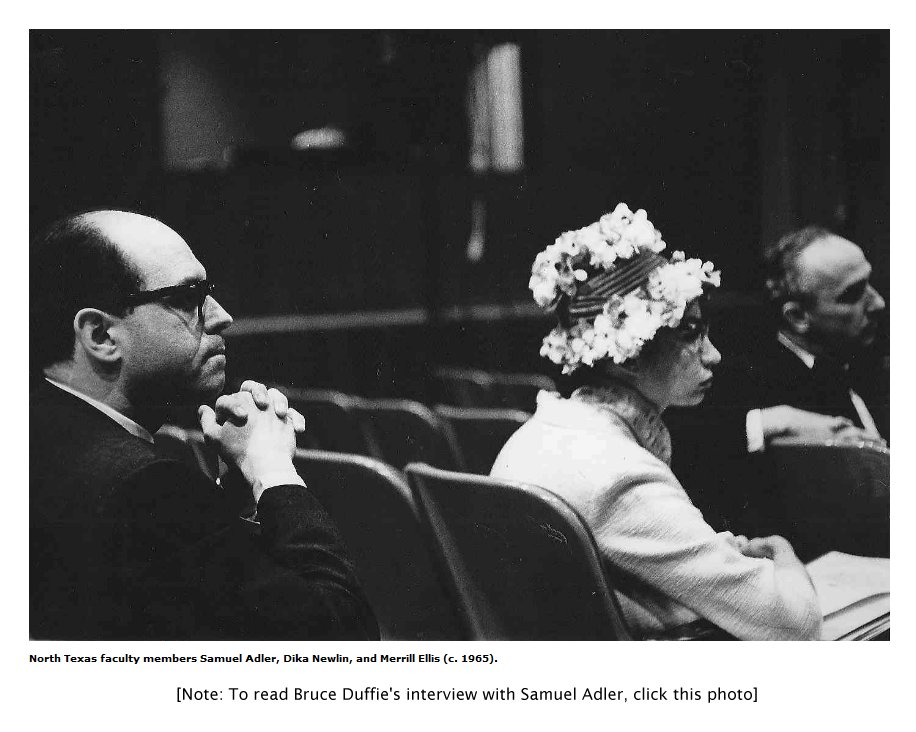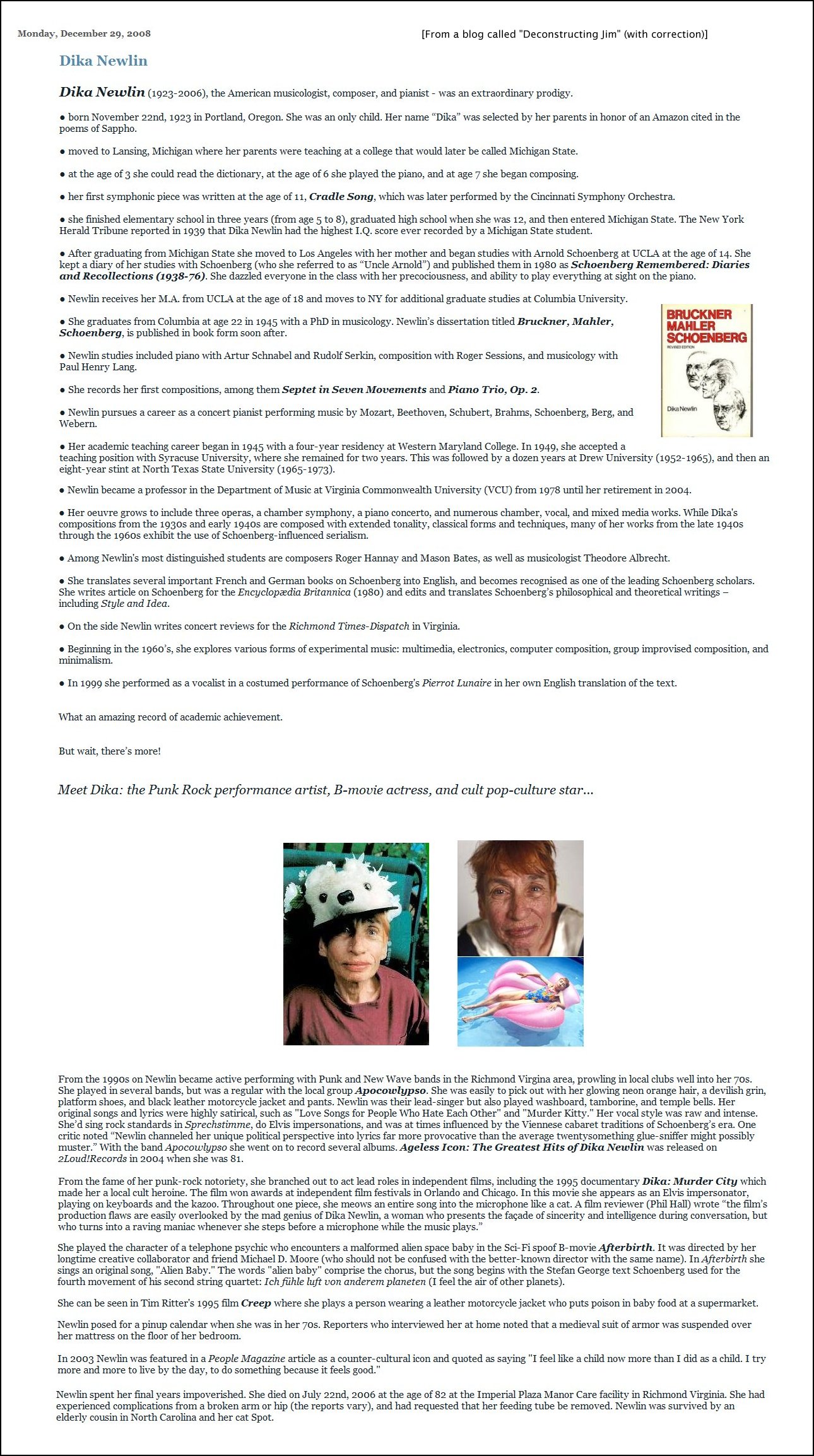A Conversation with Bruce Duffie


|
Dika Newlin, 82, Punk-Rock Schoenberg
Expert, Dies
By Douglas Martin The New York Times, July 28, 2006 Dika Newlin, who composed a symphony at 11, became a distinguished composer and musicologist and emerged, in her 70’s and 80’s, as a most unlikely punk rocker, died on July 22 in Richmond, Va. She was 82. The cause was complications of a broken arm she suffered on June 30, said Sabine Feisst, a professor of musicology at Arizona State University who is writing a book on Dr. Newlin. “It is hard to find out about me because I’m involved in so many different things,” Dr. Newlin said in an interview with The Richmond Times-Dispatch in 1996. One continuing thread: she was a professor at various universities, until her retirement from Virginia Commonwealth University two years ago. Her latest incarnation was as leather-clad, bright-orange-haired punk rocker and occasional Elvis impersonator, belting out songs like “Love Songs for People Who Hate Each Other,” which she wrote herself. Her flamboyant image was not exactly dulled when she posed in her 70’s for a pinup calendar. Dr. Newlin’s earlier prominence grew out of her studies as a teenager with the composer Arnold Schoenberg. Dr. Newlin, among the last surviving pupils of Schoenberg, wrote the entry on him for the Encyclopaedia Britannica. Dr. Feisst called Dr. Newlin “one of the pioneers of Schoenberg research in America.” Dr. Newlin’s doctoral dissertation was published as the book “Bruckner, Mahler, Schoenberg” (1947, 1968). She also translated Schoenberg’s works from German to English, and her publication of diaries she kept as his student provide some of the most intimate glimpses of him. Dr. Newlin’s own compositions reflect Schoenberg’s innovative approach. Those works include three operas, a chamber symphony, a piano concerto and numerous chamber, vocal and mixed-media works. In 1999, she sang in a costumed performance of Schoenberg’s “Pierrot Lunaire,” in her own English translation, in Lubbock, Tex. In her punk incarnation, Dr. Newlin appeared in horror movies produced by Michael D. Moore in Richmond. In “Creep” (1995), directed by Tim Ritter, her character, clad in a leather motorcycle jacket, poisons baby food on a supermarket shelf. Dr. Feisst confessed to finding this sort of thing “puzzling and disturbing” but said she came to view it as “all part of the package.” Mr. Moore also directed “Dika: Murder City’’ (1995), a documentary about Dr. Newlin. Dika Newlin, an only child, was born in Portland, Ore., on Nov. 22, 1923. Her name, chosen by her mother, refers to an Amazon in one of Sappho’s poems. Her parents, both academics, soon moved to East Lansing, Mich., to teach at what is now Michigan State University. Dika could read dictionaries at 3, played the piano at 6 and began composing at 7. She entered grade school at 5 and finished at 8. At 11, she wrote a symphonic piece, “Cradle Song.” Three years later, it was performed by the Cincinnati Symphony, with Vladimir Bakaleinikoff conducting. She finished high school at 12 and was accepted as a college student by Michigan State, where, The New York Herald Tribune said in 1939, she had the highest I.Q. score in the school’s history. At the time of the article, she was in New York to hear one of her compositions performed at the World’s Fair. After graduating from Michigan State at 16, she settled with her mother in Los Angeles so that she could attend the University of California at Los Angeles and study with Schoenberg, who taught there. She kept a diary, which she published as a book, “Schoenberg Remembered: Diaries and Recollections (1938-76),” in 1980. Reviewing the book in The New York Times Book Review, Joan Peyser marveled at its “absolute ingenuousness,” saying Dr. Newlin seemed to have censored nothing. In one entry, she tells how Schoenberg, an Austrian émigré she called Uncle Arnold, criticized her string-quartet style as “too pianistic.” She replied that she knew it wasn’t the best writing. The entry continues, “He replied, ‘No, it is not the best, nor even the second best — perhaps the 50th best, yes?’ ” She earned her doctorate in musicology from Columbia at 22. She studied piano with Artur Schnabel and Rudolf Serkin and made a half-dozen piano recordings in the United States and Europe. Many years later, in 2004, some of her punk numbers were released on an album called “Ageless Icon: The Greatest Hits of Dika Newlin.” Dr. Newlin, who never married, leaves no immediate family members. She has a surviving cousin and was close to her cat, Spot. She once kept eight or more cats. Reporters noted that she slept on a mattress on the floor with a medieval suit of armor dangling above. She told The Richmond Times-Dispatch that she had always wanted to have a rock band, and hers surely carried her own brand. Who but Dr. Newlin could have taken the text Schoenberg used for the fourth movement of his second string quartet to use as punk lyrics for “Alien Baby”? “I feel like a child more than I did as a child,” she said in an interview with People magazine in 2003. “I try more and more to live day by day, to do something because it feels good.” |
 BD:
[Laughs] You seem like somewhat of a renegade.
BD:
[Laughs] You seem like somewhat of a renegade.
This interview was recorded on the telephone on February 21,
1987. A transcript of the first half was made and
published in Sonus Magazine
in the Spring of 2008. The rest was transcribed, and the entire
conversation was edited and posted on this
website in 2013.
To see a full list (with links) of interviews which have been transcribed and posted on this website, click here.
Award - winning broadcaster Bruce Duffie was with WNIB, Classical 97 in Chicago from 1975 until its final moment as a classical station in February of 2001. His interviews have also appeared in various magazines and journals since 1980, and he now continues his broadcast series on WNUR-FM, as well as on Contemporary Classical Internet Radio.
You are invited to visit his website for more information about his work, including selected transcripts of other interviews, plus a full list of his guests. He would also like to call your attention to the photos and information about his grandfather, who was a pioneer in the automotive field more than a century ago. You may also send him E-Mail with comments, questions and suggestions.